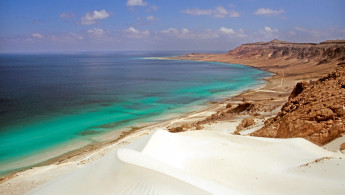Iranian ships 'illegally fishing' off Yemen's Socotra coast, minister reveals
off Somalia.
The vessels have been participating in illegal fishing in the Indian Ocean off the Gulf of Aden, Fahad Selim Kafain, the minister of fisheries on the island, said in a Facebook post.
"Iranian ships are fishing illegally and their violations are continuing in Yemeni marine waters, most recently in the west of the Socotra Archipelago and in the Arabian Sea," the Facebook post read.
It said that the vessels have come as close as "9 miles off the coast of Yemen’s Socotra island in the past week."
"The Yemeni government has appealed to the international community to fulfill its duty towards Iranian violations, and we renew our call to the international community to pressure the Iranian regime to stop attacks on our water and our wealth," it added.
The minister also accused Tehran of using illegal marine fishing in Yemeni waters to smuggle weapons to Houthi rebels, which control the capital Sanaa and much of the north.
Twitter Post
|
Since then Yemen, which is the Arab world's poorest country, has lived through a brutal and complex war, which has also seen Abedrabbo Mansour Hadi government's authority - which is fighting the Houthis - challenged by UAE-backed separatists in southern Yemen.
Yemen's government has long accused Iran of arming the the rebels though Tehran has denied all charges.
Accusations of illegal Iranian fishing in Yemeni waters come just days after analysis from vessel tracking organisations has revealed the possible presence of at least 192 Iranian fishing boats operating illegally in Somali territorial waters for over a year, according to a Monday report in The Guardian.
The data points to one of the largest illegal fishing operations in the world, depleting the domestic food supplies of a country where 15 million people are experiencing threats to food security, including a locust plague, droughts which have caused flash floods, as well as Covid-19.
The analysis, conducted by Global Fishing Watch and Trygg Mat Tracking, was made possible after Iranian vessels increased their use of collision avoidance software, allowing them to be tracked by satellites.
"The scale is staggering", TMT chief analyst Duncan Copeland told The Guardian. "It is beyond what any management plan can cope with…It’s going to deplete stocks."
Evidence suggests the 192-strong Iranian fleet is six times larger than the 31-vessel China tuna fleet licensed to fish in Somali waters.
The Somali government, plagued by years of civil war and instability, is unable to police its 2,000-mile coastline.
A 2017 report by a campaign group claimed that up to 2.4 million tonnes of fish had been caught illegally over the last 60 years, something Somalia says encourages piracy.
Adbdillahi Bidhan Warsame, the country’s minister of fisheries and marine resources, called for cooperation from Iran, after sharing the analysis with Tehran authorities.
"Illegal fishing will not be tolerated by Somalia. Illegal, unreported and unregulated (IUU) fishing in Somali water constitutes a significant threat to the food security, economic development, sovereignty and maritime ecology of Somalia" Warsame said.
Charles Kilgour, director of fisheries analysis at Global Fishing Watch, told The Guardian that some Iranian vessels were detected very close to villages, suggesting a heavy impact wrought on domestic stocks.
Follow us on Facebook, Twitter and Instagram to stay connected




 Follow the Middle East's top stories in English at The New Arab on Google News
Follow the Middle East's top stories in English at The New Arab on Google News


![A group of Palestinians, foreign and Israeli activists gather to participated in an olive picking event on the land in the town of Battir, which is under threat of confiscation by Israel in Bethlehem, occupied West Bank on 8 November 2024. [Getty]](/sites/default/files/styles/image_330x185/public/2182930803.jpeg?h=199d8c1f&itok=__0LgGsa)